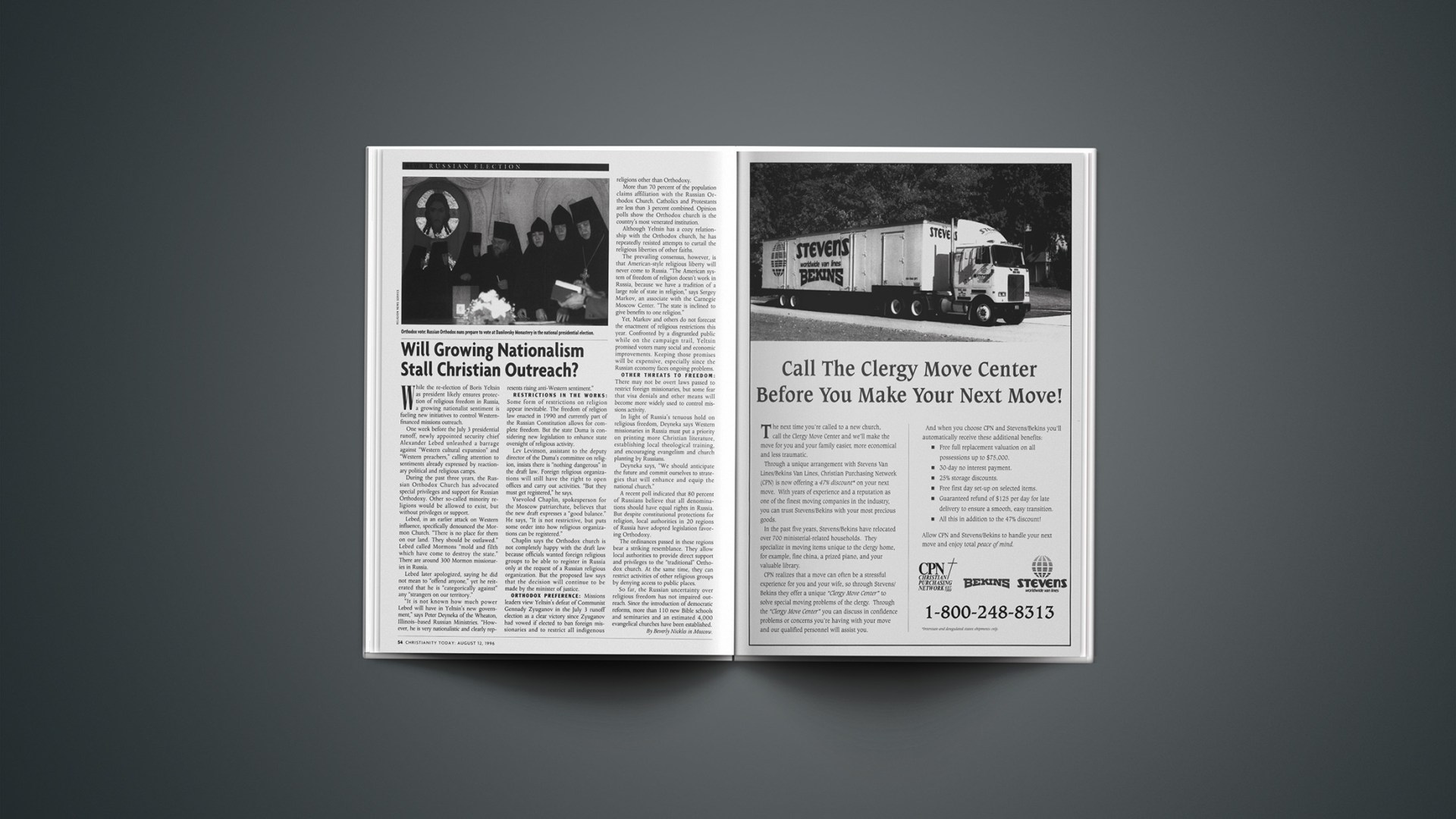One week before the July 3 presidential runoff, newly appointed security chief Alexander Lebed unleashed a barrage against “Western cultural expansion” and “Western preachers,” calling attention to sentiments already expressed by reactionary political and religious camps.
During the past three years, the Russian Orthodox Church has advocated special privileges and support for Russian Orthodoxy. Other so-called minority religions would be allowed to exist, but without privileges or support.
Lebed, in an earlier attack on Western influence, specifically denounced the Mormon Church. “There is no place for them on our land. They should be outlawed.” Lebed called Mormons “mold and filth which have come to destroy the state.” There are around 300 Mormon missionaries in Russia.
Lebed later apologized, saying he did not mean to “offend anyone,” yet he reiterated that he is “categorically against” any “strangers on our territory.”
“It is not known how much power Lebed will have in Yeltsin’s new government,” says Peter Deyneka of the Wheaton, Illinois-based Russian Ministries. “However, he is very nationalistic and clearly represents rising anti-Western sentiment.”
RESTRICTIONS IN the WORKS: Some form of restrictions on religion appear inevitable. The freedom of religion law enacted in 1990 and currently part of the Russian Constitution allows for complete freedom. But the state Duma is considering new legislation to enhance state oversight of religious activity.
Lev Levinson, assistant to the deputy director of the Duma’s committee on religion, insists there is “nothing dangerous” in the draft law. Foreign religious organizations will still have the right to open offices and carry out activities. “But they must get registered,” he says.
Vsevolod Chaplin, spokesperson for the Moscow patriarchate, believes that the new draft expresses a “good balance.” He says, “It is not restrictive, but puts some order into how religious organizations can be registered.”
Chaplin says the Orthodox church is not completely happy with the draft law because officials wanted foreign religious groups to be able to register in Russia only at the request of a Russian religious organization. But the proposed law says that the decision will continue to be made by the minister of justice.
ORTHODOX PREFERENCE: Missions leaders view Yeltsin’s defeat of Communist Gennady Zyuganov in the July 3 runoff election as a clear victory since Zyuganov had vowed if elected to ban foreign missionaries and to restrict all indigenous religions other than Orthodoxy.
More than 70 percent of the population claims affiliation with the Russian Orthodox Church. Catholics and Protestants are less than 3 percent combined. Opinion polls show the Orthodox church is the country’s most venerated institution.
Although Yeltsin has a cozy relationship with the Orthodox church, he has repeatedly resisted attempts to curtail the religious liberties of other faiths.
The prevailing consensus, however, is that American-style religious liberty will never come to Russia. “The American system of freedom of religion doesn’t work in Russia, because we have a tradition of a large role of state in religion,” says Sergey Markov, an associate with the Carnegie Moscow Center. “The state is inclined to give benefits to one religion.”
Yet, Markov and others do not forecast the enactment of religious restrictions this year. Confronted by a disgruntled public while on the campaign trail, Yeltsin promised voters many social and economic improvements. Keeping those promises will be expensive, especially since the Russian economy faces ongoing problems.
OTHER THREATS TO FREEDOM: There may not be overt laws passed to restrict foreign missionaries, but some fear that visa denials and other means will become more widely used to control missions activity.
In light of Russia’s tenuous hold on religious freedom, Deyneka says Western missionaries in Russia must put a priority on printing more Christian literature, establishing local theological training, and encouraging evangelism and church planting by Russians.
Deyneka says, “We should anticipate the future and commit ourselves to strategies that will enhance and equip the national church.”
A recent poll indicated that 80 percent of Russians believe that all denominations should have equal rights in Russia. But despite constitutional protections for religion, local authorities in 20 regions of Russia have adopted legislation favoring Orthodoxy.
The ordinances passed in these regions bear a striking resemblance. They allow local authorities to provide direct support and privileges to the “traditional” Orthodox church. At the same time, they can restrict activities of other religious groups by denying access to public places.
So far, the Russian uncertainty over religious freedom has not impaired outreach. Since the introduction of democratic reforms, more than 110 new Bible schools and seminaries and an estimated 4,000 evangelical churches have been established.
Copyright © 1996 Christianity Today. Click for reprint information.










